【英语】英语语法一般将来时归纳总结
【英语】英语语法一般将来时归纳总结
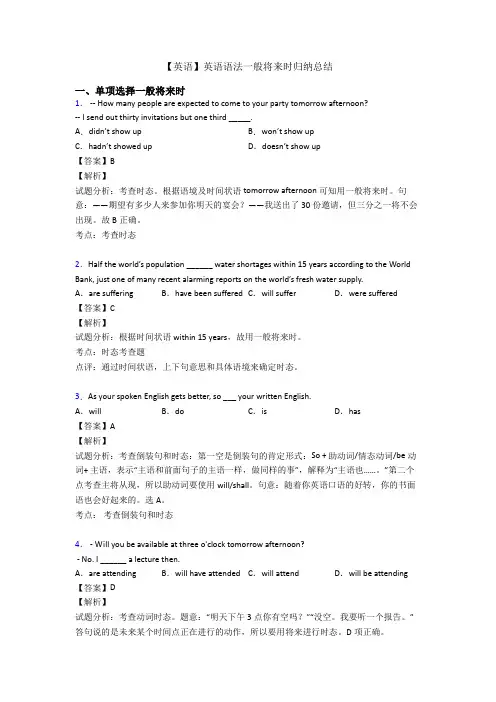
一般将来时
1.表示未来的动作或状态常用will / shall +动词(常与表示将来的时间状语边用如tomorrow、next week等)。
2.表示一种趋向或习惯动作。
例如:We’ll die without air or water.
3.表示趋向行为的动词如come, go, start, begin, leave等词常用进行时的形式表示将来时。
【英语】英语语法一般将来时归纳总结
一、单项选择一般将来时
1.-- How many people are expected to come to your party tomorrow afternoon?
-- I send out thirty invitations but one third _____.
考点:考查动词时态与体态辨析。
14.If their marketing plans succeed, they ________ their sales by 20 percent.
A.will increaseB.have been increasing
C.have increasedD.would be increasing
A.rewardedB.were rewarded
C.will rewardD.will be rewarded
【答案】D
【解析】
【分析】
【详解】
本题考查时态和语态。解题步骤:1.确定时态:根据句尾的in the end可知,事情发生在将来,用将来时。2.确定语态:efforts和reward是被动关系,应该使用被动语态。句意:学生们一直在刻苦பைடு நூலகம்习功课,他们的努力终将会得到回报。综上,用一般将来时的被动,故选D。
初二英语语法分析--一般将来时用法讲解
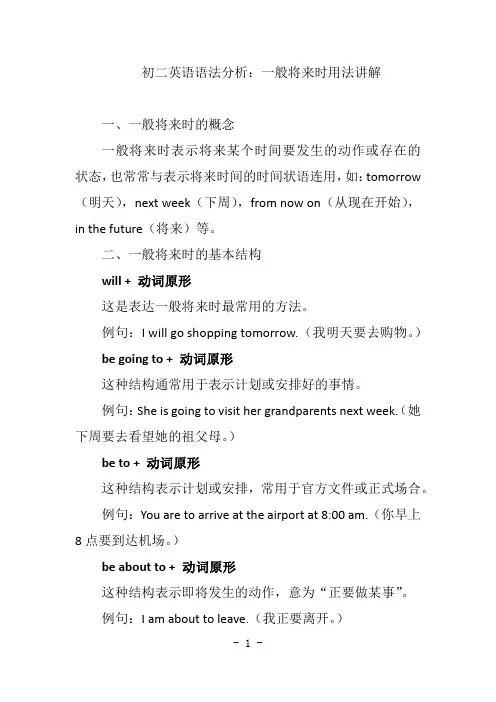
初二英语语法分析:一般将来时用法讲解一、一般将来时的概念一般将来时表示将来某个时间要发生的动作或存在的状态,也常常与表示将来时间的时间状语连用,如:tomorrow (明天),next week(下周),from now on(从现在开始),in the future(将来)等。
二、一般将来时的基本结构will + 动词原形这是表达一般将来时最常用的方法。
例句:I will go shopping tomorrow.(我明天要去购物。
)be going to + 动词原形这种结构通常用于表示计划或安排好的事情。
例句:She is going to visit her grandparents next week.(她下周要去看望她的祖父母。
)be to + 动词原形这种结构表示计划或安排,常用于官方文件或正式场合。
例句:You are to arrive at the airport at 8:00 am.(你早上8点要到达机场。
)be about to + 动词原形这种结构表示即将发生的动作,意为“正要做某事”。
例句:I am about to leave.(我正要离开。
)be due to + 动词原形这种结构表示某事预定或预期将要发生。
例句:The train is due to arrive at 5:00 pm.(火车预定下午5点到达。
)三、一般将来时的用法1表示将来的动作或状态例句:I will buy a new car next year.(明年我要买一辆新车。
)2表示将来的计划或安排例句:We are going to have a picnic this weekend.(我们这个周末要去野餐。
)3表示根据现有情况推测未来的可能性例句:It's going to rain soon.(很快就要下雨了。
)4表示命令、请求、建议等例句:You are to finish your homework before you go out.(你出去之前要把作业做完。
一般将来时态知识点详解(初中英语专项复习) (4)
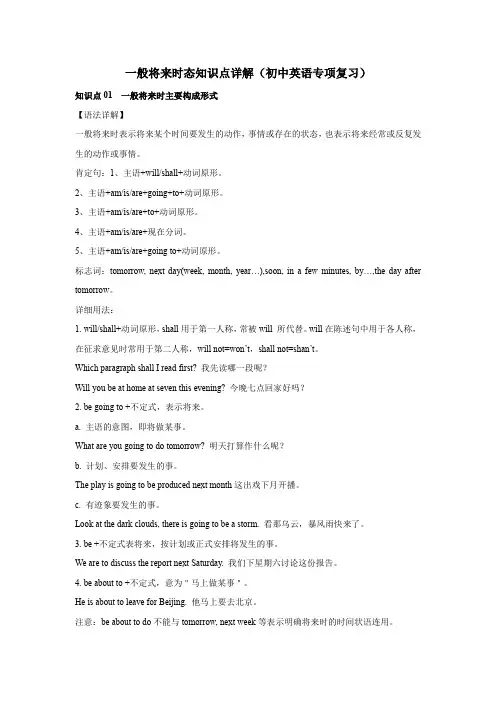
一般将来时态知识点详解(初中英语专项复习)知识点01 一般将来时主要构成形式【语法详解】一般将来时表示将来某个时间要发生的动作,事情或存在的状态,也表示将来经常或反复发生的动作或事情。
肯定句:1、主语+will/shall+动词原形。
2、主语+am/is/are+going+to+动词原形。
3、主语+am/is/are+to+动词原形。
4、主语+am/is/are+现在分词。
5、主语+am/is/are+going to+动词原形。
标志词:tomorrow, next day(week, month, year…),soon, in a few minutes, by…,the day after tomorrow。
详细用法:1. will/shall+动词原形,shall用于第一人称,常被will 所代替。
will在陈述句中用于各人称,在征求意见时常用于第二人称,will not=won’t,shall not=shan’t。
Which paragraph shall I read first? 我先读哪一段呢?Will you be at home at seven this evening? 今晚七点回家好吗?2. be going to +不定式,表示将来。
a. 主语的意图,即将做某事。
What are you going to do tomorrow? 明天打算作什么呢?b. 计划、安排要发生的事。
The play is going to be produced next month这出戏下月开播。
c. 有迹象要发生的事。
Look at the dark clouds, there is going to be a storm. 看那乌云,暴风雨快来了。
3. be +不定式表将来,按计划或正式安排将发生的事。
We are to discuss the report next Saturday. 我们下星期六讨论这份报告。
高中英语语法知识点总结-英语语法一般将来时知识点讲解
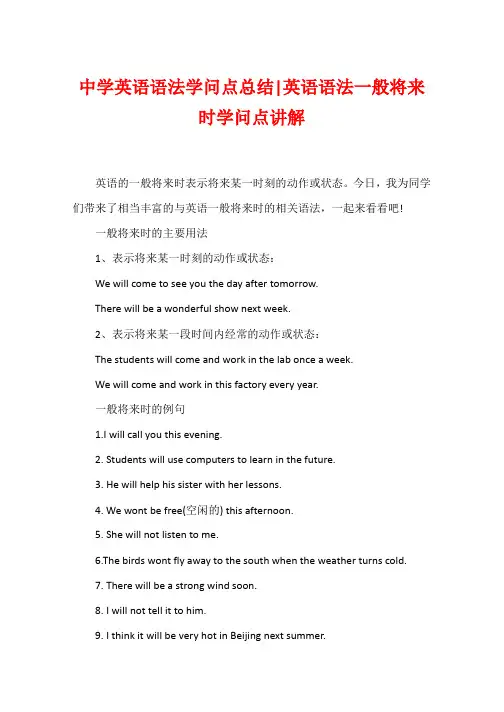
中学英语语法学问点总结|英语语法一般将来时学问点讲解英语的一般将来时表示将来某一时刻的动作或状态。
今日,我为同学们带来了相当丰富的与英语一般将来时的相关语法,一起来看看吧!一般将来时的主要用法1、表示将来某一时刻的动作或状态:We will come to see you the day after tomorrow.There will be a wonderful show next week.2、表示将来某一段时间内经常的动作或状态:The students will come and work in the lab once a week.We will come and work in this factory every year.一般将来时的例句1.I will call you this evening.2. Students will use computers to learn in the future.3. He will help his sister with her lessons.4. We wont be free(空闲的) this afternoon.5. She will not listen to me.6.The birds wont fly away to the south when the weather turns cold.7. There will be a strong wind soon.8. I will not tell it to him.9. I think it will be very hot in Beijing next summer.10.He will use his pen and his computer.11. Will there be heavy rain tomorrow?一般将来时的各种句式我们除了用be going to+动词原形可以表示一般将来时外,我们还可以用will+动词原形来表示一般将来时.will 引导的一般将来时:表示将来发生的动作或存在的状态,最基本的结构:will + 动词原形主谓(宾)句型的一般将来时:确定句:主语+ will +动词原形+(宾语)+其他Some day people will go to the moon .否定句:在will 的后面加not即可。
【初中英语】初中英语语法大全之一般将来时
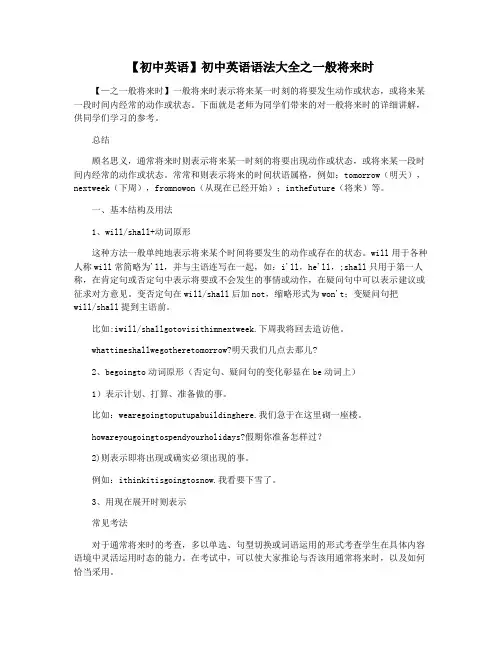
【初中英语】初中英语语法大全之一般将来时【—之一般将来时】一般将来时表示将来某一时刻的将要发生动作或状态,或将来某一段时间内经常的动作或状态。
下面就是老师为同学们带来的对一般将来时的详细讲解,供同学们学习的参考。
总结顾名思义,通常将来时则表示将来某一时刻的将要出现动作或状态,或将来某一段时间内经常的动作或状态。
常常和则表示将来的时间状语属格,例如:tomorrow(明天),nextweek(下周),fromnowon(从现在已经开始);inthefuture(将来)等。
一、基本结构及用法1、will/shall+动词原形这种方法一般单纯地表示将来某个时间将要发生的动作或存在的状态。
will用于各种人称will常简略为'll,并与主语连写在一起,如:i'll,he'll,;shall只用于第一人称,在肯定句或否定句中表示将要或不会发生的事情或动作,在疑问句中可以表示建议或征求对方意见。
变否定句在will/shall后加not,缩略形式为won't;变疑问句把will/shall提到主语前。
比如:iwill/shallgotovisithimnextweek.下周我将回去造访他。
whattimeshallwegotheretomorrow?明天我们几点去那儿?2、begoingto动词原形(否定句、疑问句的变化彰显在be动词上)1)表示计划、打算、准备做的事。
比如:wearegoingtoputupabuildinghere.我们急于在这里砌一座楼。
howareyougoingtospendyourholidays?假期你准备怎样过?2)则表示即将出现或确实必须出现的事。
例如:ithinkitisgoingtosnow.我看要下雪了。
3、用现在展开时则表示常见考法对于通常将来时的考查,多以单选、句型切换或词语运用的形式考查学生在具体内容语境中灵活运用时态的能力。
在考试中,可以使大家推论与否该用通常将来时,以及如何恰当采用。
一般将来时用法总结
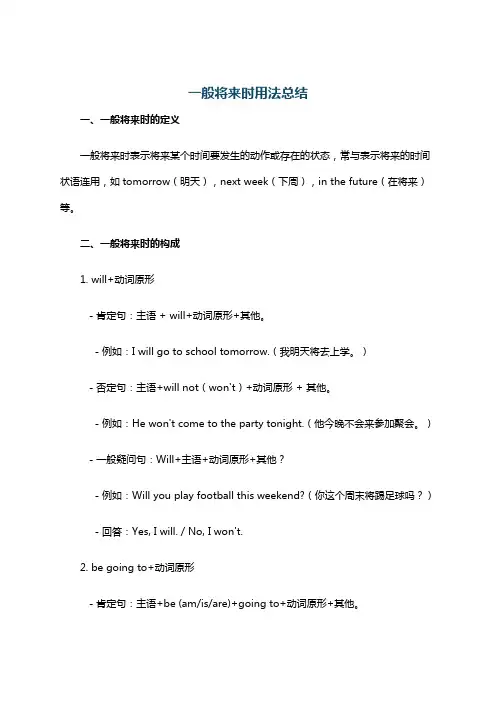
一般将来时用法总结一、一般将来时的定义一般将来时表示将来某个时间要发生的动作或存在的状态,常与表示将来的时间状语连用,如tomorrow(明天),next week(下周),in the future(在将来)等。
二、一般将来时的构成1. will+动词原形- 肯定句:主语 + will+动词原形+其他。
- 例如:I will go to school tomorrow.(我明天将去上学。
)- 否定句:主语+will not(won't)+动词原形 + 其他。
- 例如:He won't come to the party tonight.(他今晚不会来参加聚会。
) - 一般疑问句:Will+主语+动词原形+其他?- 例如:Will you play football this weekend?(你这个周末将踢足球吗?) - 回答:Yes, I will. / No, I won't.2. be going to+动词原形- 肯定句:主语+be (am/is/are)+going to+动词原形+其他。
- 例如:She is going to visit her grandparents next month.(她打算下个月去看望她的祖父母。
)- 否定句:主语+be (am/is/are)+not+going to+动词原形+其他。
- 例如:They are not going to have a meeting this afternoon.(他们今天下午不打算开会。
)- 一般疑问句:Be (am/is/are)+主语+going to+动词原形+其他?- 例如:Are you going to do your homework tonight?(你今晚打算做你的家庭作业吗?)- 回答:Yes, I am. / No, I'm not.三、一般将来时的用法1. 表示将来的计划或打算(be going to侧重于计划打算;will侧重于意愿)- I'm going to study hard this term.(我打算这个学期努力学习。
初中英语语法复习:一般将来时
初中英语语法复习:一般将来时一般将来时表示将来某一时刻的动作或状态,或将来某一段时间内经常的动作或状态。
常与一些表示将来的时间状语连用,如:tomorrow(明天),next week(下周),from now on(从现在开始);in the future(将来),in a few days等。
1、基本结构:be going to+动词原形 2. will+动词原形一般将来时:be going to+动词原形一般将来时:will+动词原形2. will 和be going to 的区别will 和be going to一般可以互用,但有时有区别:1)含时间和条件状语从句,如果主句是将来时,多用will.2)如果不是以人的意愿为转移,将来肯定会发生的动作和状态,多用will3)be going to根据迹象推测,有可能发生的事情或计划要做的事情。
3. there be 句型的一般将来式:1.There is/are going to be 2. There will be一、单项选择1.The old scientist ______ us a talk on future life next week.A.gives B.gave C.will give D.is giving2.—Jim, what are you going to do this weekend?—I ______ a movie with my dad.A.am watching B.watch C.watched D.am going to watch3.—Where’s mum?—She is trying on the new dress upstairs now. She _________ it to a party.A.wears B.wore C.will wear D.is wearing4.—What are you going to do next weekend?—There __________ a basketball match next Sunday. I want to watch it.A.will be B.will have C.is going to have D.are going to be 5.—Which team ________ the football match?—I’m not sure. The two teams both play well. Let’s wait and see.A.wins B.won C.is winning D.will win 6.Robots ________ us do some heavy and difficult jobs in the future.A.help B.helped C.are helping D.will help7.—What are you going to do next weekend, Wang Hui?—I ________ my grandparents next Sunday.A.visit B.visitedC.am visiting D.am going to visit8.I don’t know if it ________ sunny tomorrow. If it ________ sunny, I will go fishing. A.will be; is B.is; will beC.will be; is going to be D.is; is9.We are going to have a farewell party ________.A.now B.every day C.last week D.next Friday 10.There is going to ________ a basketball match tomorrow.A.be B.have C.is D.are11.Look at the dark clouds in the sky. It ________.A.is going to rain B.rained C.raining D.rainy 12.What ________you ________for tomorrow’s party?A.did; wear B.will; wear C.do; going to wear D.do; do13.He ________ busy this week. He ________ free next week.A.is; is B.will; will be C.is; will be14.There are many black clouds in the sky. It ________ soon.A.will rain B.rains C.rained D.is raining 15.It ________ warm in Dalian tomorrow.A.will be B.is C.does16.She will ________ a book about animals after school.A.buys B.buy C.is buy D.going to buy 17.Mike ________ his room yesterday, and he is going to ________ his homework tomorrow. A.cleaned; do B.cleaned; did C.clean; do18.—Our library is bright and beautiful.—Yes. Will you ________ us ________ it?A.shows; to B.show; aroundC.shows; around D.show; to19.Look! There are a lot of clouds in the sky. It is going to _______ soon.A.rains B.rainy C.be raining D.be rainy20.Li Ming ______ a T-shirt tomorrow.A.buys B.bought C.buy D.will buy 21.Sarah and I ______ a film next Sunday. We ______ horses last Sunday.A.am going to see; rode B.are going to see; rode C.will see; ride 22.—What are you going to do this weekend?—_______A.I’m going to visit my grandparents.B.I’m fine.C.I’m watching TV.D.I’m cleaning the room.23.—Peter! What is your plan for this Sunday?—I ________ my grandmother. She is in hospital.A.visit B.am visiting C.am going to visit 24.It’s cloudy all day today, but it ________ tomorrow.A.changes B.changed C.will change D.is changing 25.—Can your sister ________?—No, she can’t. But she ________ to swim next month.A.swims; is learning B.swim; is learningC.swims; is going to learn D.swim; is going to learn26.—When ________ you come back from London, Mary?—Last week. The River Thames is really beautiful and I ________ it again.A.do; visit B.did; visit C.do; am visiting D.did; will visit 27.This is our last night in China. We ________ home tomorrow.A.will fly B.fly C.flies D.flew 28.—Schools ________ different in the future.—Yes, you are right.A.is B.are C.were D.will be 29.—Why are you in a hurry, Cindy?—There ________ a basketball match between Class One and our class at 3 o’clock.A.are going to be B.will haveC.is going to have D.will be30.Tony _________ the Great Wall with his classmates next Sunday morning.A.visited B.visits C.will visit D.visit31.There ________ a sports meeting in our school next week.A.was B.were C.are D.is going to be 32.You can borrow this film—surely you _________ watching it.A.enjoy B.enjoyed C.will enjoy D.are enjoying 33.—Why are you in such a hurry, Peter?—I________ a basketball match between Class One and our class in ten minutes.A.join in B.am joining in C.joined in D.am going to join in 34.Robots and machines people do more work in the future.A.help B.will help C.are helping D.helped 35.After this exam, you ________ a wonderful holiday next month. Take it easy!A.have B.has C.had D.will have36.If it ______ rain tomorrow, my family ______ go for a walk in the park.A.isn’t, will B.doesn’t, willC.won’t, will D.won’t be, will37.—It’s hot here.—I ________ and open the window.A.go B.went C.am going D.will go 38.—When ________ Lingling ________ litter with her friend?—Next Saturday morning.A.does; collect B.did; collect C.will; collect D.is; collecting 39.Perhaps we ________ able to connect our minds to the Internet in the future.A.are B.were C.have been D.will be 40.—What’s your plan for the new term?—I ________ English well.A.learn B.learnedC.am learning D.am going to learn41.—Are you free? I’d like you to go to the museum with me.—Sorry, there _______ some important meetings this coming weekend.A.is going to have B.will have C.are going to be D.is going to be 42.There ________ schools in the future. Students will study at home.A.is going to have B.will be C.won’t have D.won’t be 43.—How will students learn then?—They ________ by computers in the classroom.A.studies B.studied C.will study D.is studying 44.—What are you going to do, Betty?—I’m going ________ football this afternoon.A.play B.to play C.played D.playing45.We hope ________ a computer on every student’s desk in the future.A.there is B.there wasC.there will have D.there will be46.—What are you going to do this Sunday?—I ________ a picnic with my parents.A.have B.had C.am having D.am going to have 47.We hope there ________ a war in the world. Everyone can live a happy life.A.will not have B.will be not C.is not going to be D.is not going to have 48.If you interview the estate agent, he ________ you much information about housing. A.gives B.gave C.will give D.is giving 49.—The radio says it ________ rain this afternoon, isn’t it?—No. I think it will be sunny.A.will go to B.is going to C.shall go to D.will be 50.Where __________ you __________ have a meeting tomorrow?A.do; go B.will; go C.are; go D.are; going to二、完成句子51.My mother will be back in an hour. (改为否定句)My mother back in an hour.52.The students will study at home in the future. (改为一般疑问句)the students at home in the future?53.Things will be different in the future. (变为一般疑问句)things in the future?54.There is a football match at the sports hall every day.(用tomorrow改写句子)a football match at the sports hall tomorrow.55.Alice is going to do her homework this afternoon. (改为—般疑问句)Alice her homework this afternoon?56.They are going to take a walk in the park. (就划线部分提问)they to in the park?57.They will meet at the school gate at 7 a.m. on Saturday. (对画线部分提问)they at the school gate?58.I’m going to learn English well because it’s very useful.(对划线部分提问)you going to learn English well?初中英语语法复习:一般将来时答案1.C【详解】句意:下周这位老科学家将给我们做一个关于未来生活的报告。
英语语法一般将来时归纳总结
【答案】B
【解析】
试题分析:考查主动形式表示被动含义用法。一些不及物动词与副词连用,表示主语的特征。如wash well,write well等;用主动形式表示被动的含义。本句中的ride well指自行车好骑;第二空的do表示行。句意:—我想买一辆很好骑的山地车。—这个行吗?根据句意说明B正确。
【解析】
试题分析:考查倒装句和时态:句意:只有你每天练习几个小时,你才能把钢琴弹好。Only+副词/介词短语/状语从句+主句(主句用部分倒装),而且这句话的时间是every day,所以用一般现在时will,选D。
考点:考查倒装句和时态
6.(吉林长春高中毕业班第一次调研)—Alas! I have left my key to the office in my car.
【答案】D
【解析】
试题分析:句意:我今天下午4点能和你们总经理说话吗?---对不起先生,他很快就去开会了。时间是soon,所以用一般将来时,这里用现在进行时代替一般将来时,所以选D。
考点:考查时态
9.If our marketing plan succeeds, we _______ the sales by thirty percent next year.
18.The audience is waiting anxiously to see which team______.
A.winsB.would win
C.will winD.had win
【答案】C
【解析】
分析句意,可知当时的比赛结果还没出来,故要用一般将来时。根据句意,可知选C。句意:观众们都在焦急地等待着看哪个队伍。
初中英语语法归纳一般将来时【英语】
【关键字】英语、初中初中英语语法归纳:一般将来时英语语法一般将来时表示将来某个时间要发生的动作,事情或存在的状态,也表示将来经常或反复发生的动作或事情。
那么,英语一般将来时的句子结构和语法特点是怎样的呢?下面为您讲解一下。
1)will/shall+动词原形shall用于第一人称,常被will 所代替。
will 在陈述句中用于各人称,在征求意见时常用于第二人称。
will not=won't shall not=shan't例如:Which paragraph shall I read first? 我先读哪一段呢?Will you be at home at seven this evening? 今晚七点回家好吗?2) be going to +不定式,表示将来。
a. 主语的意图,即将做某事。
例如:What are you going to do tomorrow? 明天打算作什么呢?b. 计划,安排要发生的事。
例如:The play is going to be produced next month。
这出戏下月开播。
c. 有迹象要发生的事。
例如:Look at the dark clouds, there is going to be a storm. 看那乌云,快要下雨了。
3) be +不定式表将来,按计划或正式安排将发生的事。
例如:We are to discuss the report next Saturday.我们下星期六讨论这份报告。
4) be about to +不定式,意为马上做某事。
例如:He is about to leave for Beijing. 他马上要去北京。
注意:be about to do 不能与tomorrow, next week 等表示明确将来时的时间状语连用。
Notice:be to和be going tobe to 表示客观安排或受人指示而做某事,be going to 表示主观的打算或计划。
一般将来时总结5篇
一般将来时总结5篇第一篇:一般将来时总结一般将来时◆ 一般将来时基本概念一般将来时表示将来某一时刻的动作或状态,或将来某一段时间内经常的动作或状态。
由助动词shall或will加动词原形构成,shall 用于第一人称,will用于第二、三人称。
除英国外的说英语的国家,在陈述句中,即使在第一人称一般也用will,在英国也有这种趋势。
在口语中,常用shall, will的缩写形式为’ll , 如:I’ll, you’ll等。
Shall not的缩写式为: shan’t, will not 的缩写式为:won’t.肯定句:I/We shall/will go.You/He/She/They Will go.否定句:I/We shall/will not go.You/He/She/They Will not go.疑问句:Shall I/we go?Will you/he/she/they go?◆一般将来时常与一些表示将来的时间状语连用,如:tomorrow(明天),next week(下周),from now on(从现在开始);in the future(将来),this year,tomorrow morning ,next month , in an hour 等。
◆一般将来时基本用法(掌握前三种)(1)Will/Shall+ 动词原形表示将要发生的动作或情况。
a.I will(shall)arrive tomorrow.我明天到。
b.Will you be free tonight? 你今晚有空吗?c.We won’t(shan’t)be bu sy this evening.我们今晚不忙。
①在一般将来时的句子中,有时有表示将来时间的状语,有时没有时间状语,这时要从意思上判断是否指未来的动作或情况。
例如:a.Will she come? 她(会)来吗?b.The meeting won’t last long.会开不了多久。
- 1、下载文档前请自行甄别文档内容的完整性,平台不提供额外的编辑、内容补充、找答案等附加服务。
- 2、"仅部分预览"的文档,不可在线预览部分如存在完整性等问题,可反馈申请退款(可完整预览的文档不适用该条件!)。
- 3、如文档侵犯您的权益,请联系客服反馈,我们会尽快为您处理(人工客服工作时间:9:00-18:30)。
【答案】D
【解析】
试题分析:考查倒装句:句意:如果我弟弟不去晚会,我也不去。Neither/Nor+倒装句,表示“…也不是”,因为if条件句用一般现在时,代替一般将来时,所以主句是一般将来时,选D。
【答案】D
【解析】
试题分析:句意:--你能给布朗先生捎个口信吗?--当然,我要为其他什么事情去见他。所以这不麻烦。第一空用将来进行时,表示将来计划,第二空填won’t be“不会”,选D。
考点:考查时态
6.- Will you be available at three o'clock tomorrow afternoon?
【答案】C
【解析】
be doing可以用来表示将来,指按照时间安排表即将发生的事情,是有计划安排的;will do强调的是主观性,不表达按时间安排表即将发生的事情。句意:得知班里一个尖子生因为家庭原因要离开学校,班主任很焦虑。
2.If my brother doesn’t go to the evening party,.
考点:考查时态
5.--- Could you take a message for Mr Brown?
--- Certainly. I ________ him about something else in any case. So it _______ any bother.
A.may see; isn’tB.see; won’t beC.will see; isn’tD.will be seeing; won’t be
17.Why don’t you put the meat in the fridge? It will_______fresh for several days.
A.be stayedB.stayC.be stayingD.have stayed
【答案】B
【解析】
【详解】
考查将来时态。句意:你为什么不把肉放进冰箱呢?会保持新鲜好几天呢。stay意为“保持”时是不及物动词,不能用于被动语态,故排除A项;stay作“保持”讲时,是表示状态的动词,没有进行时态,故排除C项;will have stayed是强调肉放入冰箱之后的结果,可肉还没有放入冰箱,故排除D项。故选B。
【解析】
试题分析:考查时态。根据句中的时间状语this weekend,可以判断用将来时。英语中经常用现在进行时代替将来时。句意:——这个周末你有什么特别的计划?——是的,我打算带我女儿去迪斯尼。故A正确。
考点:考查时态
13.If Kate goes to the gym this weekend, _______.
14.As your spoken English gets better, so ___ your written English.
A.willB.doC.isD.has
【答案】A
【解析】
试题分析:考查倒装句和时态:第一空是倒装句的肯定形式:So +助动词/情态动词/be动词+主语,表示“主语和前面句子的主语一样,做同样的事”,解释为“主语也……。”第二个点考查主将从现,所以助动词要使用will/shall。句意:随着你英语口语的好转,你的书面语也会好起来的。选A。
考点:考察时态和系动词用法
4.— You’ve left the light on.
— Oh, so I have. _____ and turn it off.
A.I goB.I’ve goneC.I’ll goD.I’m going
【答案】C
【解析】
试题分析:考查时态:句意:--你一直把灯开着。--哦,是的,我马上去,把它关了。这里用一般将来时,CD都可以表示一般将来时,will do可以表示临时决定,be going to do打算做,选C。
考点:考查动词时态与体态辨析。
16.Mrs. Morris has left for London. She ________ a speech there next week.
A.has givenB.will giveC.givesD.gave
【答案】B
【解析】
【详解】
考查时态。句意:Morris女士已经去伦敦了。她下周将在那儿做一次演讲。由next week判断为一般将来时,故选B项。
【英语】英语语法一般将来时归纳总结
一、单项选择一般将来时
1.The class teacher was anxious to hear one of his top students _____ because of family move.
A.will leaveB.is leaving
C.was leavingD.has left
考点:时态。
7.— Lucy, how are you getting on with your composition?
— I have rewritten it so many times that I wonder if I ________ it.
A.finishB.finishedC.have finishedD.will finish
考点:考查倒装句和时态
15.–Peter, do you know how to download the new software?
–Certainly. I _____ you the steps.
A.showB.am showing
C.will showD.have shown
【答案】C
【解析】
考点:考查时态
12.---Do you have any special plan for this weekend?
---Yes. I _____ my daughter to Disneyland.
A.am going to takeB.takeC.have takenD.would take
【答案】A
18.Japan’s economyin the past twenty years. No one knows how long itbefore it regains its increase.
A.has been declining; will be
B.has declined; would be
试题分析:考查动词时态与体态辨析。A. show,一般现在体;B.am showing,现在进行体;C. will show,一般将来体;D. have shown,现在完成体。句意:—彼得,你知道如何下载最新的软件吗?—当然。我会教你步骤。由句意可知show动作发生在说话动作之后,说话者的时态是一般现在时,故这里是用将来时时,表示将会做。故选C。
【答案】D
【解析】
试题分析:考查时态。能不能写完应是将来发生的动作,因此应用将来时。句意:——Lucy,你的作文写得怎样了?——我重写了太多次了,我怀疑能不能写完。故D正确。
考点:考查时态
8.It's really time I went home but I'm enjoying myself, so I ________ here a bit longer.
考点:考查时态情态动词
11.It’s your own business. If you don’t attach importance to it, who else?
A.doesB.wasC.hasD.will
【答案】D
【解析】
试题分析:句意:这是你自己的事情,如果你不重视,其他谁会重视呢?因为这句话的条件状语从句用一般现在时代替一般将来时,所以主句用一般将来时。所以选D。
10.–Are you available at 3 tomorrow afternoon?
--Sorry, I ________ a meeting at that time.
A.am havingB.will be havingC.will haveD.have
【答案】B
【解析】
试题分析:考查时态。根据时间状语at 3 tomorrow afternoon可知用将来进行时,表示将来时间点正在发生的动作。句意:——明天下午3点钟你在吗?——对不起,那时候我将正在开会。故B正确。
A.so do IB.so I do
C.so will ID.so I will
【答案】C
【解析】
试题分析:句意:如果凯特这个周末去体育馆,我也去。If引导的条件状语从句用一般现在时态表示一般将来时态,主句用一般将来时态;又因为前句说Kate去体育馆,后句说I也去体育馆,故用全部倒装。故选C。
考点:考查时态和全部倒装句。
考点:考查时态辨析
19.Many students areabout football.Theyplay a game whenever possible.
A.crazy; willB.crazy; are going to
C.fond; willD.fond; are going to
【答案】A
【解析】
【答案】D
【解析】
考查时态。句意:你看起来冻坏了。坐在火边,我给你沏一些热茶。可知下文描述的是将来的动作,故用将来时态,选D。
21.(银川部分中学高三联考)Only when you leave school________how much you love it.
A.you will findB.will you find
C.had been in decline; would take
D.was on the decline; will take
